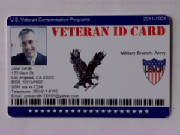|
|
|
|
Actions for VA Providers
VHA health care providers should:
1. Be acutely aware of potential rabies risk for OEF/OIF/OND Veterans who have been deployed in the previous
18 months.
2. Ensure OEF/OIF/OND Veterans are assessed for possible rabies exposure* and offered post-exposure prophylaxis
if indicated.
3. Include routine questions regarding risk for rabies exposure for OEF/OIF/OND post-deployment intake assessment
through OEF/OIF Case Management Program.
4. Increase awareness and educate OEF/OIF/OND Veterans about potential risk.
*A possible exposure is a bite or contact with the saliva of warm-blooded animals, such as dogs, cats, bats, foxes, skunks, raccoons, mongooses, and jackals (rats and mice very rarely transmit rabies and do not require rabies prophylaxis) and who had no medical evaluation or evaluation or post-exposure prophylaxis following the exposure incident. Persons presenting for incidents that occurred longer than 18 months ago are at lower risk but should not be turned away for evaluation. |
|
|
|
|
[ Benefits News ]
|
|

